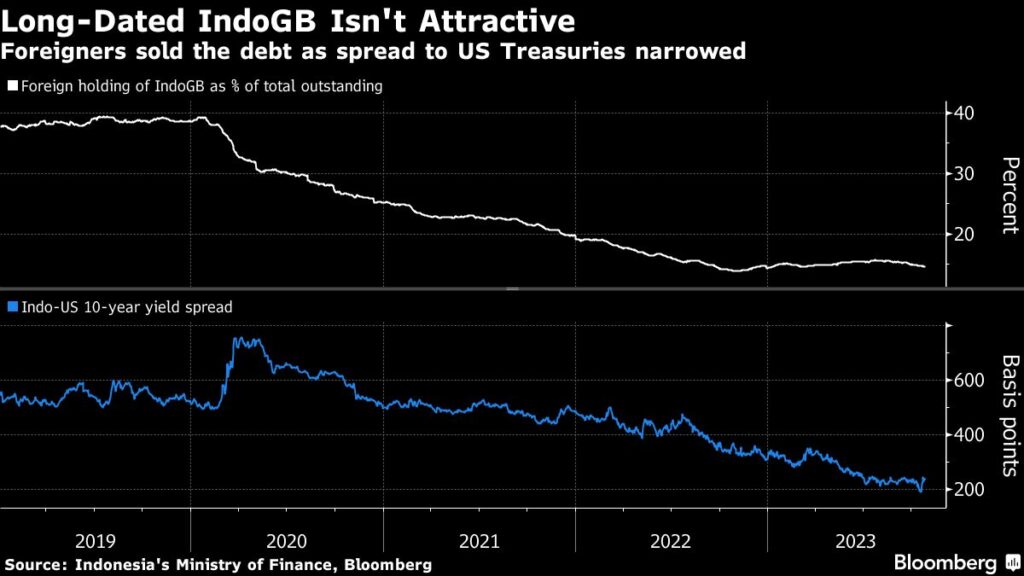(Bloomberg) — Foreign investors are setting the bar high when it comes to buying Indonesian bonds, as debt from other regions starts to look more attractive.
Most Read from Bloomberg
Yields on Indonesia’s benchmark sovereign bonds need to rise to 7.5%, which is around 80 basis points higher than where they are now, say JPMorgan Asset Management and First Sentier Investors. Brandywine Global Investment says yields may have to be at least 300 basis points above their US equivalent, compared with the current spread of around 200 basis points.
That shows investor sentiment toward Indonesian bonds, which were heavily sought after by emerging market investors before Covid, is worsening due to a weak currency and narrow rate differential with the US. Some funds are now gravitating toward bond markets including those in Latin America that are benefiting from an easy monetary policy and benign inflation.
Investors can buy Brazilian bonds for higher yields compared with the likes of Indonesia as long as they can weather higher fiscal and political uncertainties, said Desmond Soon, a portfolio manager at Western Asset Management Co.
“LatAm countries are sort of high octane, high yield and Asia is more mezzanine,” Singapore-based Soon said, adding that he is also rotating some of his fund’s exposure out of Indonesia in favor of peers like India.
Foreign investor apathy is dealing a blow to Bank Indonesia’s efforts to stabilize its currency after outflows of about $2.5 billion from rupiah debt in the last three months, the biggest in a year. Global funds now hold less than 15% of outstanding Indonesian government bonds from around 40% before the Covid, according to data compiled by Bloomberg.
The central bank issued new securities to allow short-term yields to rise, in hopes of attracting more inflows, while also buying some debt to build market confidence, but to no avail.
“BI has recently come back to start buying up some bonds because they know that the market is unraveling,” Carol Lye, portfolio manager at Brandywine Global Investment Management said last month. “On a real yield spectrum, Indonesia does well on its own — but it’s when you compare it to the rest of the markets that it doesn’t shine as bright,” said Lye who hadn’t held Indonesian sovereign bonds for a year.
Increased sensitivity of Indonesian bonds to Treasuries is also capping rupiah bond yields. The 10-year US yield fell 35 basis points in November after the Federal Reserve signaled it’s done with hiking rates. Indonesian yields of the same tenor also dropped by about the same amount to around 6.7%.
Investors are now watching if BI will tighten its policy further after it surprised markets with an interest-rate hike in October and kept the door open for more. Indonesia is in a far better position than some of its peers in Asia when it comes to managing inflation, but it falls short in comparison with LatAm.
Price gains have been within BI’s target since May, while the Philippines faces the risk of missing its price goal for a third straight year in 2024. Price pressures likely eased in Mexico, Chile and Colombia last month while the Peruvian central bank is set to cut its benchmark rate for a third consecutive meeting.
Indonesia will need to continue hiking rates in this part of the cycle as US rates stay high, said George Boubouras, head of research at hedge fund K2 Asset Management in Melbourne. “To attract foreign capital you just need to hike rates even more to make sure there’s a good spread to US Treasuries,” he said.
Tide Turning?
Still, some investors such as JPMorgan Asset Management are turning more constructive on some Indonesian debt even as they caution that yields need to climb further.
The bank bought rupiah debt with a maturity of up to two years as it sees carry-and-roll in those tenors compensating for any US Treasury volatility. The fund had taken profits on an earlier position in long-dated debt mid-year as the bonds rallied through 6.5%, he said.
First Sentier Investors has also bought two-year notes, and expects foreign investors to eventually return due to the nation’s fundamentals, said Nigel Foo, head of Asian fixed income. “Should these foreign investors come back, they will come back in a very big way,” he said.
–With assistance from Marcus Wong and Tania Chen.
Most Read from Bloomberg Businessweek
©2023 Bloomberg L.P.
Read the full article here

